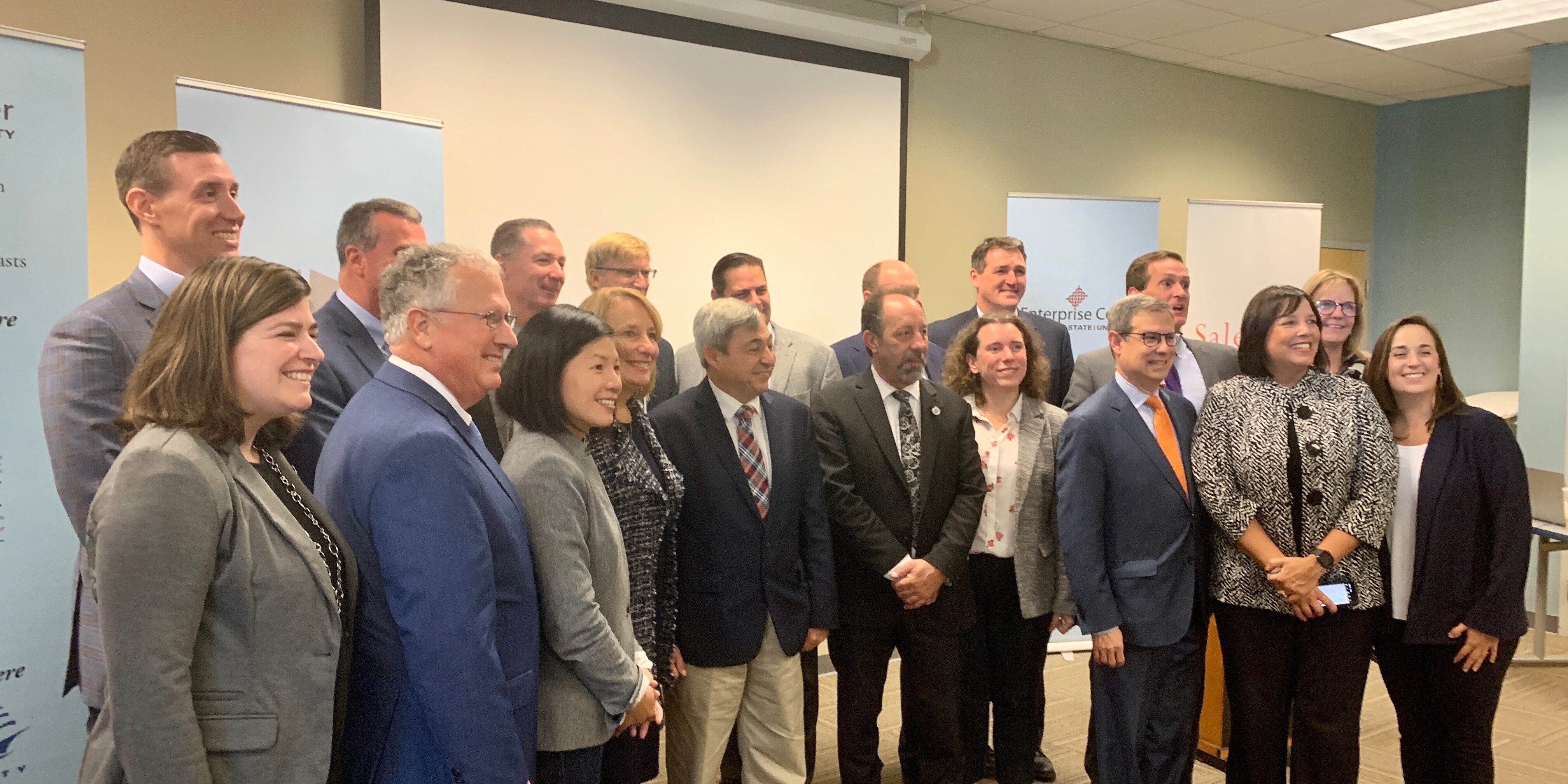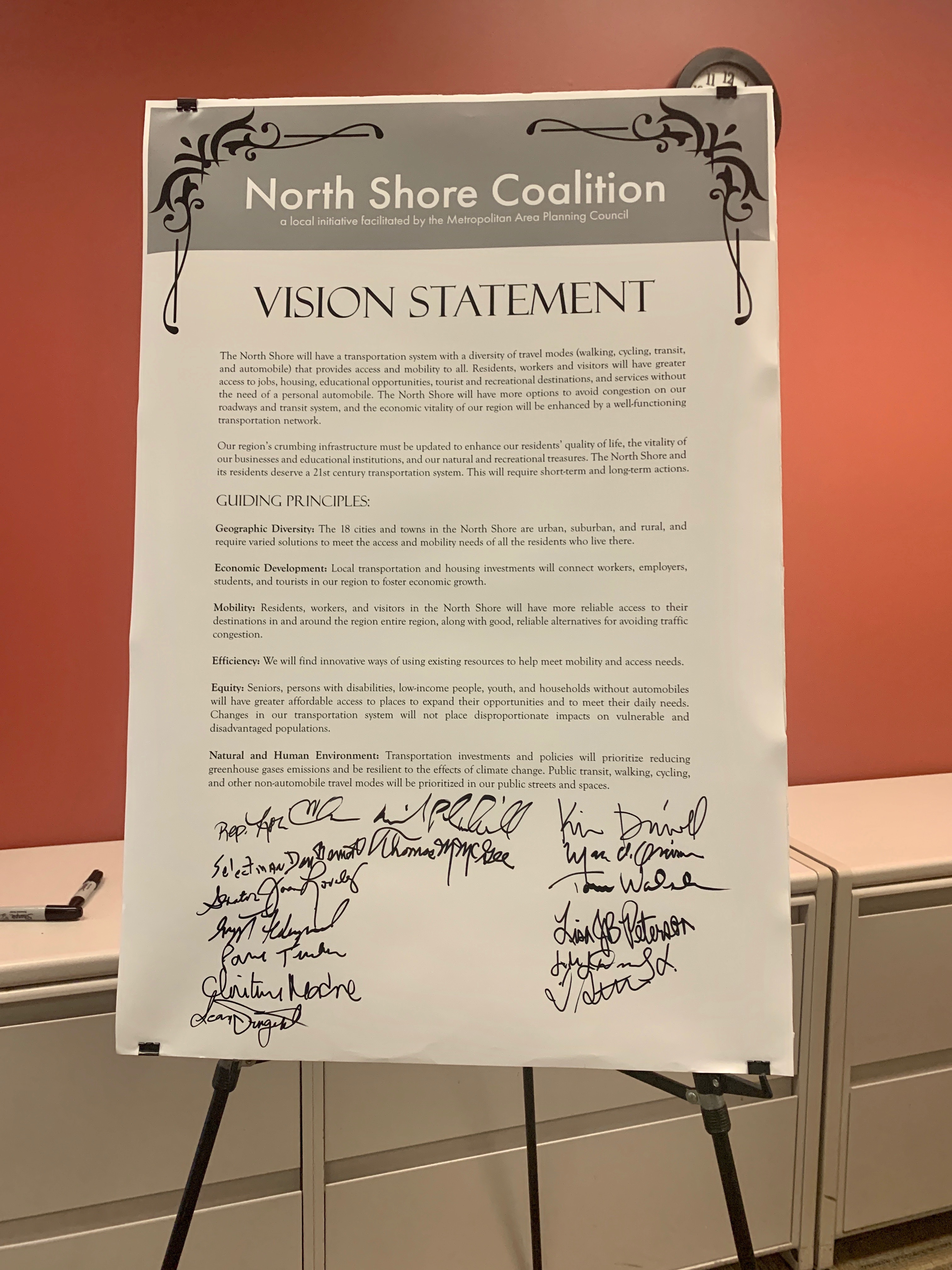
Eighteen communities in the North Shore today unveiled a joint vision for transportation in the region.
In a press conference at Salem State University’s Enterprise Center, municipal leaders in the North Shore Coalition announced a regional commitment to pursue a regional bike share program, municipal green fleets, improved water transportation services, and electrified and reliable commuter rail service. The vision includes 19 recommended action items that municipalities can undertake themselves or together with neighboring communities, to improve transportation in and around the North Shore.
Data from MAPC indicates that 108,000 North Shore residents travel to jobs outside of the region daily. 36,000 travel to Boston, Brookline, and Cambridge. About 95,000 residents in the North Shore travel to jobs within the region and an additional 68,000 residents from across the Commonwealth travel to jobs in the North Shore.
The North Shore region has experienced increased commute times in recent years, while facing higher MBTA fares. Residents of Lynn—a community only 12 miles from downtown Boston—have seen the average transit commute time increase from 44 minutes in 2010 to 54 minutes in 2017. Two important bus routes—435 and 436—that serve transit dependent workers in Peabody have an on-time performance of 60%.
“The North Shore Coalition shares a desire to improve access and transportation in the communities we live in, work in, visit and enjoy. Having an aligned vision, along with some options for funding these ideas, is critical to moving plans forward,” said Salem Mayor and Coalition Chair Kim Driscoll. “This Transportation Vision can help us chart a course and get started on this important work.”

Work toward this regional transportation vision began over a year ago when the Coalition asked the Metropolitan Area Planning Council (MAPC) to study the region’s mobility and challenges with first-and-last mile connections. In 2018, the Coalition secured funding from the Efficiency & Regionalization Grant program to implement some of the study’s recommendations. MAPC worked with the City of Beverly, the Town of Danvers, and business leaders to implement the North Shore Wave, a shuttle bus service connecting commuters from Beverly Depot Commuter Rail Station to businesses located at the Cummings Center, Trask Lane, and Cherry Hill Drive.
Residents, local leaders and businesses all agree that the current transportation system is not reliable enough to meet the needs of employees and customers in the region.
“Businesses and business leaders feel the negative impacts of an aging and unreliable transportation system just as much as our employees do,” said Colin Codner, Executive Director of the Greater Lynn Chamber of Commerce. “Our members are impacted by slower delivery of goods and services, employees’ low morale after a long or frustrating commute, and challenges retaining talent because of the current situation.”
Many North Shore communities have already started Complete Streets projects and the Coalition highlighted four other priority actions: electrifying and improving commuter rail service, expanding regional water transportation options, adopting municipal green fleet policies and expanding charging station availability, and promoting regional bike share and micromobility. The Coalition’s vision also includes 19 action items that municipalities can pursue individually, regionally and with the assistance of the Commonwealth.
"Though the impacts of increased roadway congestion and traffic are felt locally, no one community can mitigate those impacts on its own,” said Hamilton Town Administrator Joseph Domelowicz. “In order to deal with this challenge, we need to partner with the state and we need to work together regionally to ensure that strategies proposed or adopted by one community don't exacerbate the problem in neighboring cities and towns."
The group also acknowledged that the 21st century transportation system they envision will come at a financial cost, so they are also making specific recommendations for transportation funding.
Former State Senate Transportation Committee Chair and current Mayor of Lynn, Thomas McGee, said, “We are all very proud of the vision we have identified for the region. For this vision to become a reality, it will require serious commitment and action from the State House to fund these projects and other transportation projects throughout the Commonwealth. Our Coalition has identified specific recommendations to raise money for transportation, including increasing the gas tax, exploring innovative tolling mechanisms and increasing the surcharge on Uber and Lyft rides.”
“Solving our region’s transportation problems isn’t something one community can do on its own,” said Marc Draisen, Executive Director of MAPC. “Today, 18 cities and towns have come together to present a shared vision of the future of mobility on the North Shore. MAPC looks forward to working with the Coalition and state leaders to translate this vision to reality.”
Read the full vision statement here: https://www.mapc.org/wp-content/uploads/2019/11/NSC-Transportation-Vision-04.29.2019-FINAL.pdf
Read the Coalition's finance principles here: https://www.mapc.org/wp-content/uploads/2019/11/NSC-transportation-finance-principles-FINAL.pdf
The North Shore Coalition includes: Beverly, Danvers, Essex, Gloucester, Hamilton, Ipswich, Lynn, Manchester-by-the-Sea, Marblehead, Middleton, Nahant, Peabody, Rockport, Salem, Saugus, Swampscott, Topsfield and Wenham.
